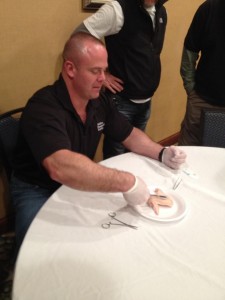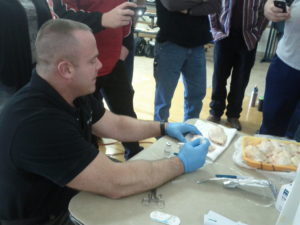| Online: | |
| Visits: | |
| Stories: |

| Story Views | |
| Now: | |
| Last Hour: | |
| Last 24 Hours: | |
| Total: | |
June Classes Scheduled in Virginia
Written by Greg Ellifritz
I have a few more openings for my upcoming classes in the Culpeper, Virginia area in a couple weeks. I will be teaching a close range shooting class on Saturday, June 20 and a Tactical Medicine class on Sunday, June 21.
Registration for either (or both) classes can be done on the FPF Training Website.
Course descriptions are below. I hope to see you there!
Extreme Close Quarters Gunfighting
The skills you learned on the target shooting range or in your CCW class may not work for you when the fight happens within arms’ reach. Extreme close range gun fighting is a completely different skill set, one that relies far more on FIGHTING than on mere shooting.
With up to 50% of gunfight fatalities occurring at ranges closer than five feet, you need this skill set! Join Greg Ellifritz as he teaches a dynamic close quarters gun fighting class that will cover the following topics:
– Retention Shooting Positions
– Body positioning and shooting stances for the close quarters fight
– In-fight weapons access and drawing skills
– Stopping and opponent’s draw
– Making contact shots without creating malfunctions
– Close quarters gun disarms
– One handed close quarters malfunction drills
– Using the pistol as an impact weapon
– Drawing and shooting from unconventional positions
– Weapons access and gun fighting from the ground
– Weapons retention, both in holster and in hand
– and numerous other techniques!
This is not the class for a beginning shooter! Proper gun handling skills and evidence of prior training is a prerequisite for the course. Prior training in a combative martial art or police defensive tactics class will be useful, but not required. The class will be somewhat physically demanding, so please show up expecting to work hard.
Tactical First Aid and “System Collapse” Medicine
- Teaching “System Collapse” wound closure techniques
This hands-on class will develop proficiency in basic battlefield medical techniques utilizing the military’s latest “Tactical Combat Casualty Care” protocols.
Students will learn to stop traumatic bleeding from gunshot and knife wounds using the latest pressure bandages, tourniquets, and hemostatic agents. Self care and care under fire will also be addressed.
Students will also learn simple patient assessment techniques, how to treat a sucking chest wound and tension pneumothorax as well as field fracture immobilization and expedient c-spine immobilization. Options for assuring clear airways (including improvised surgical airways) will be discussed.
In addition, students will learn how to treat themselves and families in the event of a long-term breakdown in our current medical system. Wound cleaning and disinfection under field conditions, injection of local anesthesia and wound closure (including minor suturing, staples, and tissue glue) will be practiced in our “trauma lab”. If time permits, students will integrate all of these skills in several practical scenarios.
Information about what types of drugs to stockpile for natural disasters or a collapse in the health care system will be discussed, along with methods for legally acquiring those pharmaceuticals. The instructor will also discuss what items should be included in a comprehensive medical kit and how to improvise those items in an austere environment
Source: http://www.activeresponsetraining.net/june-classes-scheduled-in-virginia






